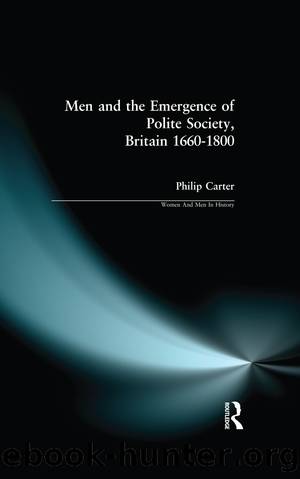Men and the Emergence of Polite Society, Britain 1660-1800 by Philip (Research Editor New Dictionary Of National Biography) Carter

Author:Philip (Research Editor, New Dictionary Of National Biography) Carter [Carter, Philip]
Language: eng
Format: epub
Tags: History, Europe, Great Britain, General
ISBN: 9781317882251
Google: zcQeBAAAQBAJ
Publisher: Routledge
Published: 2014-07-30T16:06:29+00:00
Vicesimus Knox and the pretty preacher
Edmund Burke was not the only supposed sentimentalist to draw Mary Wollstonecraftâs scorn. In her account of âwriters who have rendered women objects of pityâ, from A Vindication of the Rights of Woman (1792), she discussed the deleterious effects of several leading mid- to late-century male conduct writers, among them the popular sermon writer James Fordyce. Like Burke, Fordyce was at fault both for his interpretation and the tone of his sensibility. His was a language of extremes, a âsentimental rantâ of âpumped-up passionsâ, designed to identify the virtuous female reader (Wollstonecraft limits her discussion to Fordyceâs 1765 Sermons to Young Women) as the epitome of sensibility characterised as beauty, innocence and sensitivity. Similarly, just as Burke was guilty of duplicity, so Fordyceâs declarations were to be seen less as the product of genuine feeling than as a topical artifice aimed at subordinating women to their expected domestic roles, condemned by Wollstonecraft as âa display of cold artificial feelingsâ, a mere âparade of sensibilityâ that would never reach the heart âthough the ear may be tickledâ.93
In view of her distinctive sexual politics it is not difficult to understand Wollstonecraftâs antipathy to Fordyceâs delivery of a message which she identified as central to the construction of a restrictive and demeaning image of virtuous femininity. More striking is the mixed reception Fordyce received from other, male sentimental conduct writers from whom we might have expected agreement rather than criticism. Of course, to some Fordyce remained a forceful preacher and a paragon of modern sensitivity and refinement: a man who combined âpowers of eloquence and the fervour of pietyâ in the pulpit with a âheart of sensibility⦠peculiarly tender and affectionateâ in his domestic relations, according to two later biographical sketches.94 Others, however, remained sceptical of the sincerity of these undoubtedly popular presentations at Londonâs Monkwell Street Chapel, where Fordyce ministered between 1760 and 1772. Through the eyes of one anonymous satirist, Fordyceâs sermons appeared more the stuff of an amateur dramatist than a sober moralist. Sighing, groaning, hand-wringing and sobbing were all employed to âexpress aright the passion of his heartâ and to ignite similar emotions among his congregation. However extreme these manners might have seemed to earlier eighteenth- or indeed late-twentieth-century observers, there appears to have been nothing intrinsically out of place in such actions in a culture in which, as we have seen, physical displays of sensitivity as social refinement were actively encouraged in advice literature and fiction. Fordyceâs error was again identified as the motive behind his actions; namely the bid by this âhero of affectationâ to ingratiate himself with, and sexually arouse, his predominantly female audience. In the light of the on-going debate concerning the possible reconciliation of sensibility with manliness, it is interesting to note how, for this unknown satirist at least, histrionic duplicity earned Fordyce â or âMiss Jamesâ as he was dubbed â an effeminate persona, regardless of his own protestations of âmanly eloquenceâ.95
It was attributes such as these that
Download
This site does not store any files on its server. We only index and link to content provided by other sites. Please contact the content providers to delete copyright contents if any and email us, we'll remove relevant links or contents immediately.
Room 212 by Kate Stewart(5102)
The Crown by Robert Lacey(4805)
Endurance: Shackleton's Incredible Voyage by Alfred Lansing(4764)
The Iron Duke by The Iron Duke(4349)
The Rape of Nanking by Iris Chang(4201)
Joan of Arc by Mary Gordon(4098)
Killing England by Bill O'Reilly(3994)
Say Nothing by Patrick Radden Keefe(3974)
I'll Give You the Sun by Jandy Nelson(3428)
Shadow of Night by Deborah Harkness(3356)
Hitler's Monsters by Eric Kurlander(3327)
Mary, Queen of Scots, and the Murder of Lord Darnley by Alison Weir(3198)
Blood and Sand by Alex Von Tunzelmann(3193)
Eleanor & Park by Rainbow Rowell(3149)
Darkest Hour by Anthony McCarten(3117)
Margaret Thatcher: The Autobiography by Thatcher Margaret(3073)
Book of Life by Deborah Harkness(2929)
Red Famine: Stalin's War on Ukraine by Anne Applebaum(2923)
The One Memory of Flora Banks by Emily Barr(2856)
